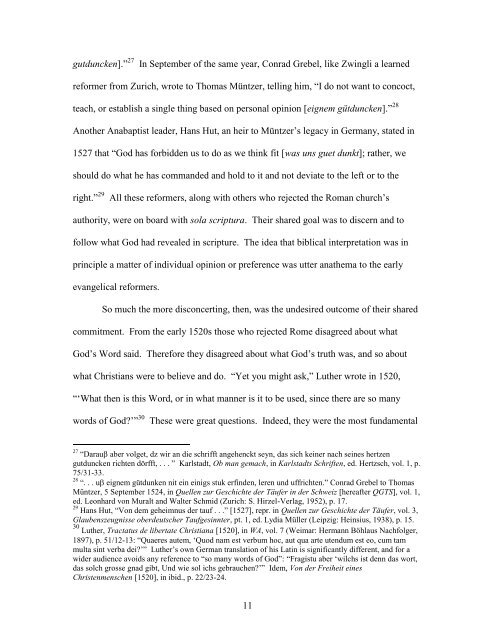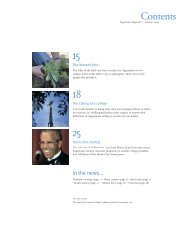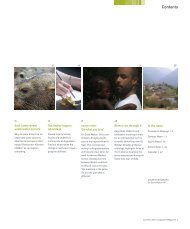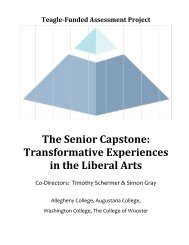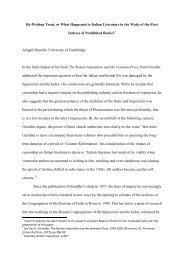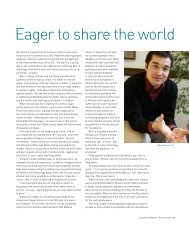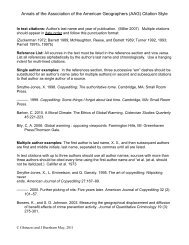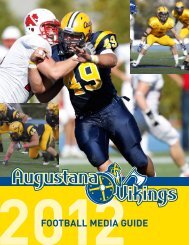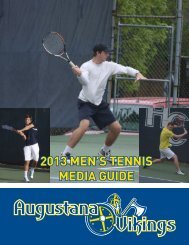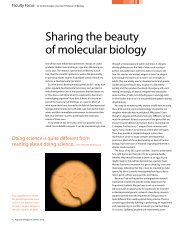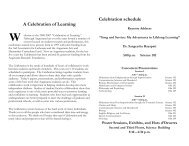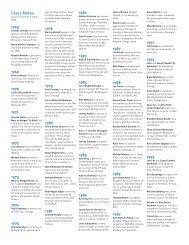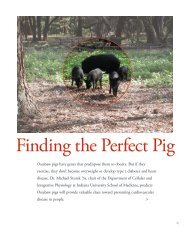Brad S. Gregory - Augustana College
Brad S. Gregory - Augustana College
Brad S. Gregory - Augustana College
You also want an ePaper? Increase the reach of your titles
YUMPU automatically turns print PDFs into web optimized ePapers that Google loves.
gutduncken].” 27 In September of the same year, Conrad Grebel, like Zwingli a learned<br />
reformer from Zurich, wrote to Thomas Müntzer, telling him, “I do not want to concoct,<br />
teach, or establish a single thing based on personal opinion [eignem gütduncken].” 28<br />
Another Anabaptist leader, Hans Hut, an heir to Müntzer‟s legacy in Germany, stated in<br />
1527 that “God has forbidden us to do as we think fit [was uns guet dunkt]; rather, we<br />
should do what he has commanded and hold to it and not deviate to the left or to the<br />
right.” 29 All these reformers, along with others who rejected the Roman church‟s<br />
authority, were on board with sola scriptura. Their shared goal was to discern and to<br />
follow what God had revealed in scripture. The idea that biblical interpretation was in<br />
principle a matter of individual opinion or preference was utter anathema to the early<br />
evangelical reformers.<br />
So much the more disconcerting, then, was the undesired outcome of their shared<br />
commitment. From the early 1520s those who rejected Rome disagreed about what<br />
God‟s Word said. Therefore they disagreed about what God‟s truth was, and so about<br />
what Christians were to believe and do. “Yet you might ask,” Luther wrote in 1520,<br />
“„What then is this Word, or in what manner is it to be used, since there are so many<br />
words of God?‟” 30 These were great questions. Indeed, they were the most fundamental<br />
27 “Darau aber volget, dz wir an die schrifft angehenckt seyn, das sich keiner nach seines hertzen<br />
gutduncken richten dörfft, . . . ” Karlstadt, Ob man gemach, in Karlstadts Schriften, ed. Hertzsch, vol. 1, p.<br />
75/31-33.<br />
28 “. . . u eignem gütdunken nit ein einigs stuk erfinden, leren und uffrichten.” Conrad Grebel to Thomas<br />
Müntzer, 5 September 1524, in Quellen zur Geschichte der Täufer in der Schweiz [hereafter QGTS], vol. 1,<br />
ed. Leonhard von Muralt and Walter Schmid (Zurich: S. Hirzel-Verlag, 1952), p. 17.<br />
29 Hans Hut, “Von dem geheimnus der tauf . . .” [1527], repr. in Quellen zur Geschichte der Täufer, vol. 3,<br />
Glaubenszeugnisse oberdeutscher Taufgesinnter, pt. 1, ed. Lydia Müller (Leipzig: Heinsius, 1938), p. 15.<br />
30 Luther, Tractatus de libertate Christiana [1520], in WA, vol. 7 (Weimar: Hermann Böhlaus Nachfolger,<br />
1897), p. 51/12-13: “Quaeres autem, „Quod nam est verbum hoc, aut qua arte utendum est eo, cum tam<br />
multa sint verba dei?‟” Luther‟s own German translation of his Latin is significantly different, and for a<br />
wider audience avoids any reference to “so many words of God”: “Fragistu aber „wilchs ist denn das wort,<br />
das solch grosse gnad gibt, Und wie sol ichs gebrauchen?‟” Idem, Von der Freiheit eines<br />
Christenmenschen [1520], in ibid., p. 22/23-24.<br />
11


